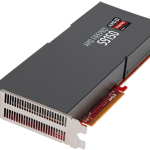Finding oil and gas has always been a tricky proposition, given that reserves are primarily hidden underground, and often as not, under the ocean as well. The costs involved in acquiring rights to a site, drilling the wells, and operating them are considerable and has driven the industry to adopt advanced technologies for locating the most promising sites. As a consequence, oil and gas exploration today is essentially an exercise in scientific visualization and modeling, employing some of most advanced computational technologies available.
With GPUOpen, CGG Fuels Petroleum Exploration using AMD FirePro GPUs
Today AMD announced that CGG, a pioneering global geophysical services and equipment company, has deployed AMD FirePro S9150 server GPUs to accelerate its geoscience oil and gas research efforts, harnessing more than 1 PetaFLOPS of GPU processing power. Employing AMD’s HPC GPU Computing software tools available on GPUOpen.com, CGG rapidly converted its in-house Nvidia CUDA code to OpenCL for seismic data processing running on an AMD FirePro S9150 GPU production cluster, enabling fast, cost-effective GPU-powered research.
How HPC is increasing speed and accuracy
The overwhelming task of high performance computing today is the processing of huge amounts of data quickly and accurately. Just adding greater numbers of more intensive, sophisticated servers only partially solves the problem.
Big Energy Breaks New Ground in Supercomputing
“Today, energy companies mark the world leaders in commercial supercomputing. Companies like Total are utilizing high performance computing (HPC) to deliver an optimal combination of performance, price and efficiency. Supercomputers like Pangea deliver 10 times the computing capacity of the system it replaced, helping Total identify and exploit new reserves more effectively.”
The Business Case for Exascale in Seismic Exploration
“The business case for exascale in O&G is extremely compelling, and — as anyone who has read Daniel Yergin’s “The Prize” will appreciate — goes to the very core of why IOCs exist. In the search for oil and gas in the Gulf of Mexico — one of the richest hydrocarbon basins in the world that continues to reinvent itself for exploration plays — the biggest prizes lie in ultra-deep water. In a deeply submerged area about 300 miles southwest of New Orleans and extending into Mexico waters, rock formations from the Paleogene period, also known as the Lower Tertiary, represent the leading edge of deep-water oil discovery. “
Univa Grid Engine Integrates with ECLIPSE Reservoir Simulator
Univa Grid Engine has been certified and integrated with Schlumberger’s ECLIPSE industry-reference reservoir simulator software.









